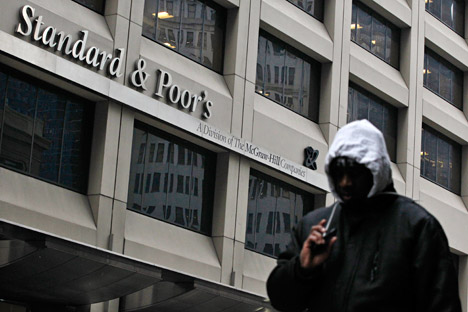
The Standard & Poor's building in New York.
ReutersThe Svobodnaya Pressa news and commentary website reviews the outgoing year, which was overshadowed economically by the confrontation between Russia and the West.
First, the Standard & Poor’s, Moody’s, and Fitch ratings agencies downgraded Russia’s ratings. As a result, Russia’s costs for servicing foreign debt have increased, while investors have largely lost interest in Russian securities.
In response, Russian gas giant Gazprom announced that by 2020 it would give up Ukraine as a transit route for its gas supplies to Europe completely and would establish transit supplies via the Turkish Stream pipeline under the Black Sea. Europe was left to urgently resolve the issue of how to transport gas from the Greek border.
However, by July it became clear that the strategy of bypassing Ukraine via the southern route was not working: Gazprom announced that the potential capacity of the Turkish Stream pipeline would be halved. A month later, the European Commission openly declared that it would resist any of Gazprom’s projects aimed to stop gas transit via Ukraine.
In July, following the news that Tehran and the P5+1 group had reached a comprehensive agreement on the Iranian nuclear program, oil prices began to fall dramatically.
This delivered a serious blow to the Russian budget and significantly devalued the ruble.
Throughout the year, the EU and the U.S. several times expanded or extended their sanctions against Russia (imposed over Russia’s role in the 2014 Ukraine crisis – RBTH). In response, Russia extended its ban on food imports from the U.S., Canada, Norway, Australia and EU countries for another year and added Albania, Montenegro, Iceland, Lichtenstein, and Ukraine to the ban.
“External factors have quite a significant part to play in the situation which the Russian economy finds itself in,” said the head of finance and economy section at the Institute of Contemporary Development, Nikita Maslennikov.
“The key role, of course, belongs to falling oil prices and the end of the whole commodities cycle in the world economy.
“If we look at the overall economic outcome of all the external factors – commodities prices and the sanctions – this year Russia has been short-changed of, according to experts’ estimates, some $200 billion, or 1-1.5 percent of potential GDP growth,” said Maslennikov.
“What does it mean? In 2015, our economy will most likely drop by 3.9 percent of GDP. Only 1.5 percent of that amount is in fact generated by the effect of external shocks.
“So it is logical to wonder: Had none of this happened, had oil prices not fallen and had the West not imposed the sanctions, would we be in a crisis or not? It turns out that yes, we would. Because the above figures show that the main causes of the economic slowdown in Russia are created not by external but by internal factors.”
Russian artists have been flown to the Khmeimim airbase in Latakia, Syria to give a New Year concert for the Russian military personnel serving there, news website Gazeta.ru reports. According to the artists, the event was not commercial – they were flown to the base on board a special Defense Ministry aircraft, and they felt under no danger at the base, writes Gazeta.ru
Many of the artists who took part in the concert preferred not to publicize their trip to Syria, but there were those who decided to go public with it, like singer Zara for example.
“It was a great honor for me to perform for our officers and servicemen. I admire, and I think the whole country does too, their daily heroism for the sake of fighting the terrorist threat so that it does not reach our borders. And of course I wished them a safe return home to their families and a happy New Year. And I told them that we are very proud of them,” said Zara.
At the same time, according to singer Ruslan Alekhno “there were many those who refused to go.”
“I am very proud of our servicemen. I cannot even imagine what would happen if the terrorist plague reaches civilians and our children, who live, enjoy life and look into the future. And all this is possible thanks to our military,” he said.
The Moscow Metro’s newest station, called Tekhnopark, was opened on Dec. 28 as part of a pilot scheme. It is fitted with a contactless payment system, reports daily tabloid Komsomolskaya Pravda. All you have to do is touch your Visa bank card to the turnstile and it will let you through, having charged the standard fee for a single journey (50 rubles) from your bank account.
Similar technology will soon be installed at several other stations, including Marksistskaya on the yellow line.
All rights reserved by Rossiyskaya Gazeta.
Subscribe
to our newsletter!
Get the week's best stories straight to your inbox